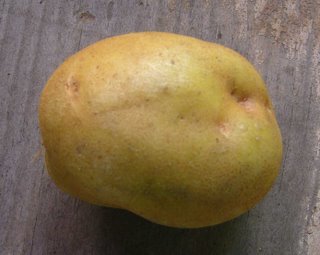Bad Poetry: The Potato
 Lillian E. Curtis was a Chicago poetess. She penned the following probably in the 1870's. That's right around the time my home, the Pascal Emory house, was being built.
Lillian E. Curtis was a Chicago poetess. She penned the following probably in the 1870's. That's right around the time my home, the Pascal Emory house, was being built.Curtis wrote two books of verse, Forget-Me -Not and Patchwork. The manuscript of a third, The Casket, was destroyed in a fire. She was popular enough in her day to be published--and Forget-Me-Not was picked up by two different publishers.
The success of Lillian E. Curtis gives me hope. Copies of her books now sit in the libraries of Harvard, Yale, Brown, UCLA, and my own alma mater, Purdue. Could it be possible that I'm trying too hard to achieve literary greatness? Could the key to my own fame be no farther away than my pantry?
The Potato
What on this wide earth,
That is made, or does by nature grow,
Is more homely, yet more beautiful,
Than the useful Potato?
What on this wide earth,
That is made, or does by nature grow,
Is more homely, yet more beautiful,
Than the useful Potato?
What would this world full of people do,
Rich and poor, high and low,
Were it not for this little-thought-of
But very necessary Potato?
True 'tis homely to look on,
Nothing pretty in even its blow,
But it will bear acquaintance,
This useful Potato.
For when it is cooked and opened,
It's so white and mellow,
You forget it ever was homely,
This useful Potato.
On the whole it is a very plain plant,
Makes no conspicuous show.
But the internal appearance is lovely,
Of the unostentatious Potato.
The useful and the beautiful
Are not far apart we know.
And thus the beautiful are glad to have,
The homely looking Potato.
On the land, or on the sea,
Wherever we may go,
We are always glad to welcome
The homely Potato.
A practical and moral lesson
This may plainly show,
That though homely, our heart can be
Like that of the homely Potato.
Labels: bad poetry, poetry

